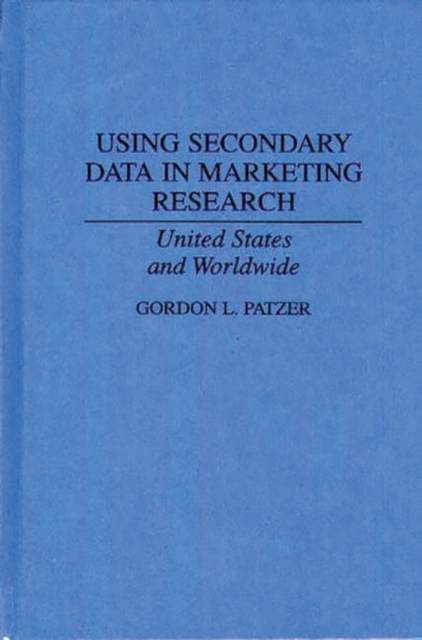
En raison d'une grêve chez bpost, votre commande pourrait être retardée. Vous avez besoin d’un livre rapidement ? Nos magasins vous accueillent à bras ouverts !
- Retrait gratuit dans votre magasin Club
- 7.000.000 titres dans notre catalogue
- Payer en toute sécurité
- Toujours un magasin près de chez vous
En raison de la grêve chez bpost, votre commande pourrait être retardée. Vous avez besoin d’un livre rapidement ? Nos magasins vous accueillent à bras ouverts !
- Retrait gratuit dans votre magasin Club
- 7.000.0000 titres dans notre catalogue
- Payer en toute sécurité
- Toujours un magasin près de chez vous
Using Secondary Data in Marketing Research
United States and Worldwide
Gordon L Patzer
Livre relié | Anglais
127,45 €
+ 254 points
Description
Using Secondary Data in Marketing Research discusses thoroughly the use of secondary data in marketing research. It explains the underlying reasons why secondary data are less expensive than primary data, the technology associated with secondary data, how to evaluate the quality of secondary data, and how to locate secondary data. It also provides an encyclopedic listing of specific sources of secondary data, including a listing of sources of global/worldwide information to assist marketing decision making. An important resource for marketing professionals, academics, and graduate students of marketing.
The book begins with an overview that includes an international case in marketing. The following six chapters comprise the first part of the book, which delineates the advantages and disadvantages of secondary data, and reveals precisely how to evaluate their quality. These chapters identify differences between internal and external secondary data, including specific types of each. The second part begins with an overview that also includes an actual case in marketing. The following five chapters contain comprehensive listings of specific secondary data information sources, categorized according to the following: sources of information specific to marketing; global/worldwide information sources; sources of information regarding American Census Data; information sources about industries, corporations, and finances; and general business information sources.Spécifications
Parties prenantes
- Auteur(s) :
- Editeur:
Contenu
- Nombre de pages :
- 184
- Langue:
- Anglais
Caractéristiques
- EAN:
- 9780899309613
- Date de parution :
- 18-03-95
- Format:
- Livre relié
- Format numérique:
- Genaaid
- Dimensions :
- 140 mm x 216 mm
- Poids :
- 381 g

Les avis
Nous publions uniquement les avis qui respectent les conditions requises. Consultez nos conditions pour les avis.






